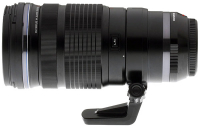Beyond the Kit: The best Olympus lenses for pretty much everything
posted Monday, June 5, 2017 at 1:28 PM EDT

Okay, so you're not a Canon person, nor a Nikon shooter… No, you've decided against a DSLR altogether, making the move to Micro Four Thirds -- in particular, Olympus cameras. That's pretty cool! Welcome to the world of smaller, lighter cameras and lenses.
Many of us here at IR enjoy shooting with Olympus cameras quite a bit (some of us even own one). The performance and image quality characteristics of many of the Olympus Micro Four Thirds cameras we've reviewed over the years, especially recently, have received top marks from us, a few even earning coveted spots in our annual Camera of the Year Awards. Suffice it to say, Olympus cameras are excellent tools for those wanting top-quality photos without the weight and bulk of traditional DSLRs.

Who is this article for?
For the purposes of this article, we're making the assumption that you're a beginner- to intermediate-level photographer who just picked up (or is about to pick up) his or her first Olympus Micro Four Thirds camera, be it a stylish PEN-series model or a rugged OM-D rig. Some Olympus cameras are sold with included "kit" lenses, such as the 14-42mm f/3.5-5.6 II R, while others can be purchased body-only. Either way, if you're a current Olympus camera owner looking to upgrade beyond your included kit lens, this list is for you; similarly, if you're looking to buy a body-only Olympus camera and need a lens or two to go with it, we've got you covered there as well.
Since there are so many different types of subjects as well as personal tastes and styles that go into what lenses to use, it's nearly impossible to pick "the best lens" and call it a day. There's no such thing as the perfect lens that'll do it all (at least not yet anyway -- one can hope, right?). With that, we've broken up our selections into a variety of photographic subjects, such as portraits, street photography, sports, and so on, which should help you narrow down your options and help you pick a lens that best suits your needs. Within each category, we've also selected two choices, a more affordable (yet still excellent) choice (sub-$500), as well as an "upgrade" pick for those wanting to spend more for premium features, such as weather-sealing, better build quality, unique features and higher performance.
And just a quick note before we dive in, yes, given the Micro Four Thirds standard, we could have also suggested lenses from Panasonic, Sigma, Samyang, Laowa, Voigtländer and various other manufacturers. However, we've decided for the purposes of this recommendation list to stick with just Olympus-brand lenses for the sake of simplicity as well as to provide a selection of lenses that offer full compatibility with Olympus cameras -- certain features, such as Sync I.S. on some OM-D models, for instance, are only fully compatible with Olympus lenses.
Without further ado, let's go…
Best Olympus Lenses for Portraits
First Choice:
Olympus 45mm f/1.8
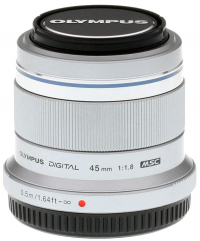
If you're looking for a medium-telephoto focal length and a bright aperture for that classic portrait look -- sharp, isolated subjects with smooth blurred background -- it's hard to ignore the $299 wonder that is the Olympus 45mm f/1.8. The lens is extremely sharp, even wide open, and displays very little distortion -- a great characteristic for a portrait-centric lens. There's a minor vignetting (darkened corners) at f/1.8 as well as some minimal chromatic aberration (magenta and blue-ish fringing) that we observed in the corners on high-contrast areas, but mostly these two characteristics were not much of an issue to overall image quality performance.
The lens is also super-compact and lightweight, at less than two inches long and around 2.2 inches in diameter with a weight of only 116 grams (about 4 oz.). It'll take up next to no space in your bag (or heck, your pocket), and certainly won't weigh you down thanks to its sturdy yet nearly all-plastic construction (the mount is metal, though).
If you're looking for an excellent portrait lens for your Olympus camera, the 45mm f/1.8 is a no-brainer.
Buy Now ($299): B&H • Amazon • Adorama
The Upgrade Pick:
Olympus 75mm f/1.8
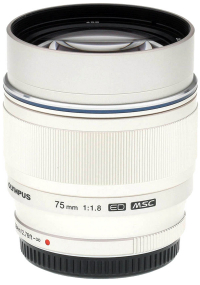
With a 150mm-equivalent focal length, the 75mm f/1.8 is a bit more unique and definitely more specialized as a portrait lens compared to the 45mm f/1.8 (90mm eq.). However, that longer focal length combined with the wide f/1.8 aperture creates just a dreamy, perfect pairing to create gorgeous portraits. Based on our lab tests, the 75mm f/1.8 is one of the sharpest lenses we've ever reviewed. The image quality is simply fantastic, with tack-sharp images even at f/1.8.
One of the few "Made in Japan" Micro Four Thirds lenses from Olympus, the 75mm f/1.8 is a jewel; sturdy, all-metal barrel construction with glass elements that are essentially "poured" inside. It looks great, it feels great and it just works really well. The only real negatives are the limited close-focusing performance, and that the long 150mm-eq. focal length can be a bit tricky to work with for any kind of close-quarters or indoor shooting. If you can deal with the higher cost, the Olympus 75mm f/1.8 is simply stunning.
Buy Now ($899): B&H • Amazon • Adorama
Best Olympus Lenses for Landscapes
First Choice:
Olympus 9-18mm f/4-5.6
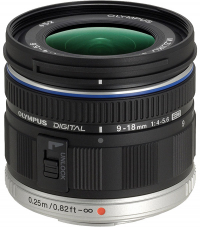
If you've already got that 14-42mm kit lens, you already quite a versatile lens that should work nicely for landscape photography. However, with a 28mm-eq. focal length at the wide-end, the 14-42mm isn't quite wide enough for those epic, sprawling, dramatic landscape shots. If you want to get that ultra-wide perspective, one of the best picks that won't break the bank is the Olympus 9-18mm f/4-5.6 zoom lens.
With an ultra-compact design, this 18-36mm-eq. ultra-wide angle zoom offers a cool view of the world without weighing you down (the construction is mostly all plastic, but it still feels sturdy). Optically, it's pretty impressive, too; sharpness is quite good, especially if you stop down some (which you'll likely do for landscape shots anyway). CA is a bit of an issue, but that likely can be cleared up quickly in post-processing.
Overall, at around $600, the 9-18mm f/4-5.6 lens is a great companion to the 14-42mm kit lens, offering lots of versatility for taking your landscape photography to the next level -- and, unlike our upgrade pick below, the 9-18mm offers the ability to easily use screw-on filters like polarizers and neutral density filters.
Buy Now ($599): B&H • Amazon • Adorama
The Upgrade Pick:
Olympus 7-14mm f/4 Pro
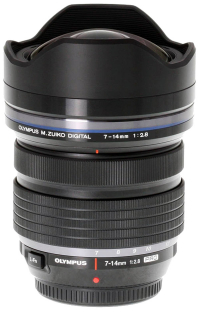
Ah, perhaps the premier ultra-wide zoom lens for Olympus photographers! The 7-14mm f/2.8 Pro lens is an absolute stunner. Part of Olympus' top-of-the-line "Zuiko Pro" series, the 7-14mm f/2.8 lens is built like a tank (and weighs a bit like one, too, but it's still not as heavy as a DSLR competitor though). The lens is fully weather-sealed, offers a bright and constant f/2.8 aperture, and, of course, captures excellent, super-sharp images. It's not cheap though. At around $1,200, it's up there at the top-tier price range for Olympus MFT lenses.
Offering a wider angle, 14mm-eq. at the widest, than our 9-18mm pick, the 7-14mm is the widest non-fisheye lens that Olympus currently makes, allowing you to capture some really unique, dramatic and expansive landscape photos. Sharpness is excellent towards the center at f/2.8, but the corners can be a bit soft -- not that surprising for such a wide lens, so you'd do well to stop down some for better edge-to-edge sharpness. Though landscape photos tend to utilize narrower apertures for increased depth of field, the f/2.8 aperture of the 7-14mm gives you the ability work in lower-light situations, such as with nightscape shots and astrophotography, for instance.
The big limitation is the lack of filter threads due the 7-14mm large, bulbous front element. If you're truly serious about landscape photography, which we assume you are if you're looking to pick up this lens, then you'll likely be familiar with square filters from the likes of LEE, Cokin, NISI and a number of brands. There's likely a filter adapter that can be attached to the front of the 7-14mm. It is an extra expense to consider when picking this lens, however, so keep that in mind.
Buy Now ($1,199): B&H • Amazon • Adorama
Best Olympus Lenses for Street Photography
First Choice:
Olympus 25mm f/1.8

Basically Olympus' answer to the "Nifty Fifty," this pocketable and highly affordable 50mm-eq. prime lens offers an excellent bang for your buck. Priced right at $300, the 25mm f/1.8 is nevertheless classified as one of Olympus' "Zuiko Premium" lenses. Constructed with a durable plastic and metal mount, the lens is super small, light yet very solid. It's compact size is a definite advantage for street shooting as it keeps your camera rig small and nimble. The 50mm-eq. focal length, too, allows for some distance between you and your subject(s), which can help a lot if you're going for those casual, candid moments. The f/1.8 aperture provides excellent bokeh and nice subject isolation, making it great for street shots as well as classic portraits.
Optically, the lens is super-sharp, even at f/1.8; there is a bit of vignetting at the wider apertures, but it's not too bad. CA is also very well controlled. The 25mm, like our other lens picks in this article, offers super-fast autofocus performance, which helps capture the decisive, often-fleeting moments when out on the street.
Buy Now ($299): B&H • Amazon • Adorama
The Upgrade Pick:
Olympus 25mm f/1.2 Pro
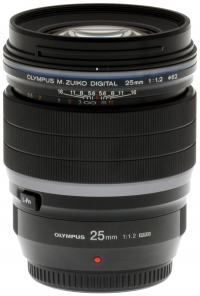
The crème-de-la-crème of 25mm lenses for Oly cameras! One of the newest members (at the time of this writing) to Olympus' Zuiko Pro series, the 25mm f/1.2 Pro lens is a surprisingly compact yet ultra-fast and super-rugged prime lens. With its f/1.2 maximum aperture, this lens offers superb subject isolation and bokeh potential as well as excellent performance in low-light situations. Plus, the sharpness is amazing, even at f/1.2, and the lens is tack-sharp edge-to-edge by f/2.
The sleek metal body feels very solid and well built, with a fully weather-sealed construction like the other 'Pro' models. The 25mm f/1.2 is definitely beefier and heavier than is typical for Olympus prime lenses, but it still feels great in the hand. There is also a nice focus distance and depth-of-field scale, which is exposed when the lens is placed into manual focus mode; something that's not offered on the 25mm f/1.8 lens.
At $1200, it's certainly much more expensive compared to most other prime lenses in Olympus' lineup, but if you can swing the cash, you won't be disappointed.
Buy Now ($1,199): B&H • Amazon • Adorama
Best Olympus Lenses for Sports & Wildlife
First Choice:
Olympus 40-150mm f/4-5.6
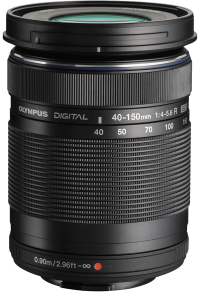
Perhaps one of, if not the best bangs for your buck for Olympus users, the highly versatile 40-150mm f/4-5.6 R lens will set up back a mere $99. If you're setting up your Olympus rig, pairing the 14-42mm kit lens with this 40-150mm lens with net you tons and tons of versatility in the focal length department without doing much damage to your wallet.
While the aperture range of f/4-5.6 isn't the brightest, making the low-light performance a noticeable weak point, the lens is otherwise an excellent choice for daytime and other outdoor subject matter, such as photographing your child's soccer game from the sidelines, a day at the zoo or many types of larger wildlife. The 80-300mm-eq. focal length range is extremely versatile for a variety of subjects, helping you bring that far-away action up close.
Quality-wise, the 40-150mm is impressively sharp for what you're paying, even across the entire focal length range. The build is decent, too; again, it's mostly all polycarbonate plastic, but it keeps the lens small and lightweight. If you need thes extra reach that your kit lens just can't deliver and don't want to break the bank, definitely look at the 40-150mm f/4-5.6 lens!
Buy Now ($99): B&H • Amazon • Adorama
The Upgrade Pick:
Olympus 40-150mm f/2.8 Pro

Another Zuiko Pro lens makes our list. More or less Olympus' answer to the classic 70-200mm f/2.8 zooms for DSLR cameras, 40-150mm f/2.8 Pro, like our other 40-150mm pick, offers a bit more range than the DSLR options at 80-300mm-eq. while also providing a constant f/2.8 aperture. The 40-150mm f/2.8 is also compatible with Olympus' 1.4x teleconverter, which adds to its versatility, making this lens practically a one-stop-shop for a wide variety of telephoto-centric subjects: sports (both indoor and outdoor) like basketball, football or soccer from the sidelines as well as a vast range of outdoor and wildlife subject matter.
Top-notch build quality -- again, metal construction and robust weather sealing -- combines with excellent AF perform and, of course, superb sharpness to create one fantastic telephoto zoom lens. In our lab tests, the 40-150mm f/2.8 wasn't just sharp for a zoom lens, it was "prime sharp." In short, it's really, really good. While the Zuiko Pro lenses are all larger than typical Olympus MFT lenses, the 40-150mm f/2.8 is quite a bit larger than most others, verging into similar size territory to DSLR lenses. It's not nearly as hefty and as chunky as, say, a Canon 70-200mm f/2.8L IS II, but it's definitely a larger and more serious lens that has some bulk to it.
Like other Zuiko Pro lenses, the 40-150mm f/2.8 comes with a premium price, but if you want the best mid-to-long telephoto zoom from Olympus, this is it.
Buy Now ($1,399): B&H • Amazon • Adorama
The Best All-In-One Zoom for Olympus
First Choice:
Olympus 14-150mm f/4-5.6 II
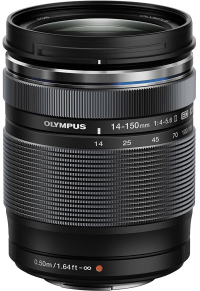
For those who want a simple, single-lens solution for general photography and an altogether lightweight setup, you can't really go wrong with the 14-150mm f/4-5.6 II. Offering a 28-300mm-eq focal length range, this powerful zoom lens is a fine choice for everything from landscapes, portraits, to telephoto shots like sports and wildlife. With the f/4-5.6 aperture range, it might not be the best choice for indoors or low-light situations, however, so keep that in mind -- grab that tripod!
We reviewed the original version of this lens, which offered pretty decent sharpness across the zoom range; it's not the sharpest, but still rather good for a high-powered "long-zoom" lens, which often have to make some optical sacrifices in the name of convenience. The new "Mark II" model doesn't appear to make major changes to the optical formula apart from adding an anti-reflective and scratch-resistance coating to the front element. The body styling and build quality, however, do get an upgrade, including full weather-sealing, which is rather unique for a non-Zuiko Pro lens.
At $500, the 14-150mm f/4-5.6 II is a fairly budget-friendly all-in-one solution for times when a single-lens setup is all that's needed, no matter the weather conditions -- but just be sure your camera is weather-sealed, too!
Buy Now ($499): B&H • Amazon • Adorama
The Upgrade Pick:
Olympus 12-100mm f/4 IS Pro
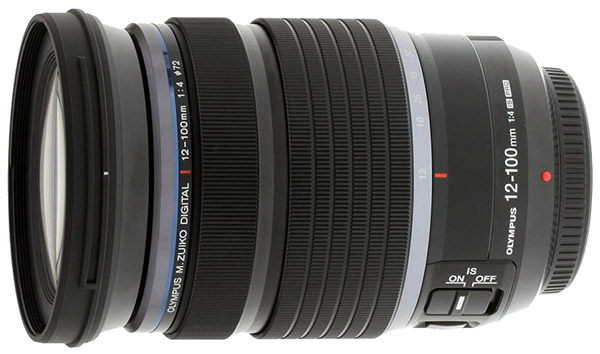
Though the Olympus 12-100mm f/4 IS Pro will work on any Olympus Micro Four Thirds lens, it's really well-suited for the OM-D crowd, in particular the E-M1 Mark II given the lens' optical image stabilization. When paired with the E-M1 II, you'll have up to 6.5-stops of hand-holding correction, which is just insane and lets you shoot with some amazingly slow shutter speeds without a tripod. Without the E-M1 II, the 12-100mm still offers around 5-stops of stabilization, so you're basically covered regardless of what camera you use.
Stabilization aside, the 12-100mm Pro lens is another optically fantastic lens that offers amazing, tack-sharp performance across the entire zoom range, even wide open. Despite the versatile zoom range, Olympus' engineers somehow managed to avoid the quality degradation that's typically seen in other long-zoom lenses. Build quality, like other Zuiko Pro lenses, is top-notch and sealed-up tight.
If you want a top-notch single lens setup, perhaps for traveling, hiking, or just keeping your camera bag's weight to a minimum, the 12-100mm f/4 IS Pro is that lens. As expected, it's definitely pricey, but its versatility and quality make it a winner for pretty much whatever you want to throw at it.
Buy Now ($1,299): B&H • Amazon • Adorama
The Ultimate Kit Lens for Olympus
The Only Choice:
Olympus 12-40mm f/2.8 Pro
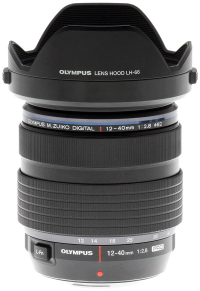
Of course, it's easy to forget about the most versatile lens on the block, the Olympus 12-40mm f/2.8... While the newer 12-100mm f/4 IS Pro offers more versatility in the focal length department, making it an excellent choice for a single-lens setup, the f/4 aperture is definitely limiting if lower light performance is important to you. If having a constant f/2.8 aperture is key for you, be it for low-light work or better depth of field performance, you can't really go wrong with the Olympus 12-40mm f/2.8. With a 24-80mm-eq. focal length range, the 12-40mm is no slouch in the versatility department either, offering that classic workhorse "24-70mm"-ish zoom range. But, unlike its DSLR counterparts, the 12-40mm f/2.8 is much more compact and significantly lighter.
Like other Zuiko Pro lenses, the 12-40mm offers rock-solid build quality -- sturdy metal construction and robust weather-sealing -- as well as fantastic optical performance. The lens is stunningly sharp across the focal length range, and even when used at f/2.8. Chromatic aberration, distortion and vignetting are all very well controlled, as well. At around $900, it's certainly a significant chunk of change, but given its build quality and optical performance, we think it's well worth the price. For low light and daylight, if you need the best "kit lens" upgrade, the Olympus 12-40mm f/2.8 is the lens to pick.
Buy Now ($899.99): B&H • Amazon • Adorama
-- Thanks to IR reader, Douglas, for the suggestion!
• • • • •
Curious about the best lenses for other brands? See our picks for Canon and Nikon below:
• 8 best lenses for your new Canon DSLR • 11 best lenses for your new Nikon DSLR •
